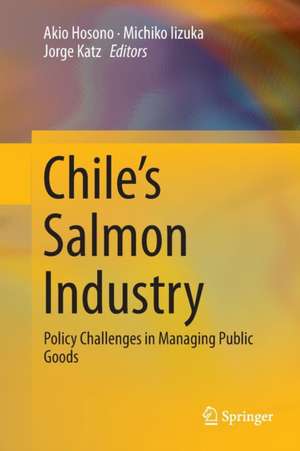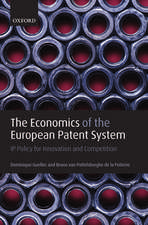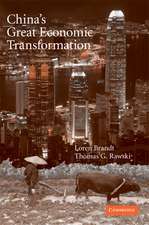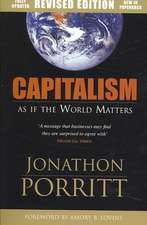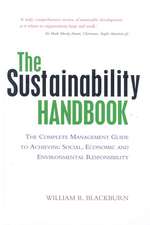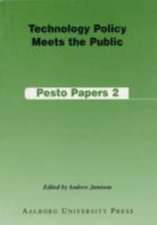Chile’s Salmon Industry: Policy Challenges in Managing Public Goods
Editat de Akio Hosono, Michiko Iizuka, Jorge Katzen Limba Engleză Paperback – 22 apr 2018
is problematic for policy studies based on a complex web of interactions among numerous agents. The present volume untangles this web by considering the development of the Chilean salmon industry not only in holistic and historic termsbut also from a socioeconomic point of view. The valuable book offers insightful lessons that can be applied to other natural resource-based sectors facing similar
challenges in the course of development.
Normal 0 false false false EN-US JA X-NONE /* Style Definitions */ table.MsoNormalTable{mso-style-name:標準の表;mso-tstyle-rowband-size:0;mso-tstyle-colband-size:0;mso-style-noshow:yes;mso-style-priority:99;mso-style-parent:"";mso-padding-alt:0cm 5.4pt 0cm 5.4pt;mso-para-margin-top:0cm;mso-para-margin-right:0cm;mso-para-margin-bottom:10.0pt;mso-para-margin-left:0cm;line-height:115%;mso-pagination:widow-orphan;font-size:11.0pt;font-family:"Calibri","sans-serif";mso-ascii-font-family:Calibri;mso-ascii-theme-font:minor-latin;mso-hansi-font-family:Calibri;mso-hansi-theme-font:minor-latin;}
| Toate formatele și edițiile | Preț | Express |
|---|---|---|
| Paperback (1) | 637.13 lei 6-8 săpt. | |
| Springer – 22 apr 2018 | 637.13 lei 6-8 săpt. | |
| Hardback (1) | 643.34 lei 6-8 săpt. | |
| Springer – 26 apr 2016 | 643.34 lei 6-8 săpt. |
Preț: 637.13 lei
Preț vechi: 749.56 lei
-15% Nou
Puncte Express: 956
Preț estimativ în valută:
121.91€ • 127.63$ • 100.88£
121.91€ • 127.63$ • 100.88£
Carte tipărită la comandă
Livrare economică 05-19 aprilie
Preluare comenzi: 021 569.72.76
Specificații
ISBN-13: 9784431566892
ISBN-10: 4431566899
Ilustrații: XVIII, 210 p. 43 illus., 34 illus. in color.
Dimensiuni: 155 x 235 mm
Greutate: 0.33 kg
Ediția:Softcover reprint of the original 1st ed. 2016
Editura: Springer
Colecția Springer
Locul publicării:Tokyo, Japan
ISBN-10: 4431566899
Ilustrații: XVIII, 210 p. 43 illus., 34 illus. in color.
Dimensiuni: 155 x 235 mm
Greutate: 0.33 kg
Ediția:Softcover reprint of the original 1st ed. 2016
Editura: Springer
Colecția Springer
Locul publicării:Tokyo, Japan
Cuprins
Introduction
Chapter 1. Creation of a New Industry: Genesis of the Chilean Salmon Industry.- Chapter 2. Takeoff of a New Industry: Establishment and Early Development Phases of Chilean Salmon Farming.- Chapter 3. Increasing Industrial Scale and Complexity: Formation of a Chilean Salmon Cluster and Value Chains Under Globalization.- Chapter 4. Environmental Collapse and Institutional Restructuring: A Sanitary Crisis in the Chilean Salmon Industry.- Chapter 5. Transformation of Institutions: Crisis and Change in Institutions for the Chilean Salmon Industry.- Chapter 6. The Future of Natural Resource Activities: A Lesson from the Chilean Salmon Industry.- Chapter 7. Conclusion and Policy Implications.
Chapter 1. Creation of a New Industry: Genesis of the Chilean Salmon Industry.- Chapter 2. Takeoff of a New Industry: Establishment and Early Development Phases of Chilean Salmon Farming.- Chapter 3. Increasing Industrial Scale and Complexity: Formation of a Chilean Salmon Cluster and Value Chains Under Globalization.- Chapter 4. Environmental Collapse and Institutional Restructuring: A Sanitary Crisis in the Chilean Salmon Industry.- Chapter 5. Transformation of Institutions: Crisis and Change in Institutions for the Chilean Salmon Industry.- Chapter 6. The Future of Natural Resource Activities: A Lesson from the Chilean Salmon Industry.- Chapter 7. Conclusion and Policy Implications.
Textul de pe ultima copertă
This book is the first to analyze Chile’s salmon farming industry in discussing industrial development in terms of the management of public goods. The book highlights important aspects of learning and capacity development, environmental sustainability, institutions, and social welfare or inclusiveness. With aquaculture now providing almost half the global fish harvest, Chile’s salmon farming and processing industry stands out as a leader in the new “blue revolution”. Taking a holistic, historic approach to understanding the evolutionary development of the industry, the authors employ this strategy in the belief that policy discussions of economic activities have become highly segmented and often provide only a partial picture. Such segmentation is problematic for policy studies based on a complex web of interactions among numerous agents. The present volume untangles this web by considering the development of the Chilean salmon industry not only in holistic and historic terms but alsofrom a socioeconomic point of view. The valuable book offers insightful lessons that can be applied to other natural resource-based sectors facing similar challenges in the course of development.
Caracteristici
Is the first book to discuss the role of public policies in industrial development in the case of Chile’s salmon industry focusing on management of public goods Makes a unique contribution to the holistic and historical analysis of policy interventions for natural resources-based industrial development Offers insightful lessons that can be applied to other natural resources-based sectors facing similar challenges in the course of development
